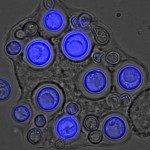Link to Pubmed [PMID] – 25178919
Int. J. Antimicrob. Agents 2014 Oct;44(4):290-4
Whilst it used to affect mostly intravenous drug users and patients who underwent valvular surgery with suboptimal infection control procedures, fungal endocarditis is now mostly observed in patients with severe immunodeficiency (onco-haematology), in association with chronic central venous access and broad-spectrum antibiotic use. The incidence of fungal endocarditis has probably decreased in most developed countries with access to harm-reduction policies (i.e. needle exchange programmes) and with improved infection control procedures during cardiac surgery. Use of specific blood culture bottles for diagnosis of fungal endocarditis has decreased due to optimisation of media and automated culture systems. Meanwhile, the advent of rapid techniques, including fungal antigen detection (galactomannan, mannan/anti-mannan antibodies and β-1,3-d-glucans) and PCR (e.g. universal fungal PCR targeting 18S rRNA genes), shall improve sensitivity and reduce diagnostics delays, although limited data are available on their use for the diagnosis of fungal endocarditis. New antifungal agents available since the early 2000s may represent dramatic improvement for fungal endocarditis: (i) a new class, the echinocandins, has the potential to improve the management of Candida endocarditis owing to its fungicidal effect on yeasts as well as tolerability of increased dosages; and (ii) improved survival in patients with invasive aspergillosis with voriconazole compared with amphotericin B, and this may apply to Aspergillus sp. endocarditis as well, although its prognosis remains dismal. These achievements may allow selected patients to be cured with prolonged medical treatment alone when surgery is considered too risky.

